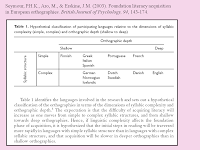The poll has closed. Thank you for participating! Exactly 50% of the 98 voters viewed English as more complex than German, Spanish, and French, at least from a reading and spelling perspective. Yes, several researchers would agree. I show the poll below, and discuss the relative difficulty associated with spelling -- and reading -- English words.
 |
| (Click image to enlarge) |
For more on the difficulties associated with spelling and reading in English, see English is Difficult, a humorous article by Michael Quinion of World Wide Words.
But keep in mind, some would argue that English orthography is not wierd or random. They make the case that the English orthorgraphic system is orderly, logical -- even elegant. For example, see this brief You Tube video featuring Gina Cooke, an expert in Real Spelling. (Be advised, some comments use rough language, not suitable for school. The video is also available at TED.com, but without the comments.)
Implications for Teachers and Students:
Learning to read and write in English is no cakewalk -- even if you take the approach suggested by Gina Cooke. When learning English compared to Spanish, for example, sight word identification will probably be more difficult. Errors are more likely. Phonological awareness instruction is more essential (Frost, 2005). The challenge is great, especially for children who experience reading difficulties like dyslexia, and for children of poverty, particularly if they have few encounters with books in the home. The challenge may also confound English language learners. Thus, we must make phonemes, graphemes, morphemes, and word meanings explicit. Devote time to reading, writing, and word study. Read and explore informational texts to build content knowledge, discussed in a prior post.
In a language this complex, fluency may not come easily. As Dr. Hasbrouck mentioned in the prior post, readers who are fluent are more apt to read a lot, resulting in greater vocabulary expansion. Who knows? Avid readers and seekers might even develop a lasting interest in a particular topic and become über-motivated. Attentive and alert. Curious and increasingly confident. Hopefully, the development of interest is still a prime goal of education, as described years ago by Edward Thorndike (1906) and John Dewey (1913).
Pass the word along. Tell students they struggle with English because it is complex, but remind them also that they can solve this fascinating puzzle if they sort out the patterns and practice daily. Affirm every attempt. Help every teacher and parent understand the nature of this fabulous beast.
PS. Grammar is another story. Believe it or not, English grammar is relatively simple when compared to other large languages. Science Daily reports on pertinent new research from the University of Pennsylvania and the University of Memphis.
References:
Frost, R. (2005). Orthographic systems and skilled word recognition processes in reading. In M. J. Snowling, & C. Hulme (Eds.), The science of reading: A handbook. (pp. 272-295). Malden, MA: Blackwell Publishing.
Seymour, P.H.K., Aro, M., & Erskine, J.M. (2003). Foundation literacy acquisition in European orthographies. British Journal of Psychology, 94, 143-17.
Thorndike, E. L. (1906). The Principles of Teaching: Based on Psychology. A. G. Seiler: New York.
University of Pennsylvania (2010, January 21). Language structure is partly determined by social structure. ScienceDaily. Retrieved January 23, 2010.